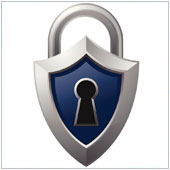
Since October is Cyber Security month in the US, it’s the perfect time to take a look into ways you can make your business and systems more secure. Here are five tips that can help you protect personal information held by your company.
1. Change your passwords
One of the weakest links in the security chain is the passwords used to access your programs, networks, and systems. Ensure that your passwords are strong. At the very least use a mixture of capital and lowercase letters, numbers, and special characters like ! or @. This makes passwords harder to crack.
Change your passwords on a regular basis. At least once a year is good, but it is far preferable to change them every 90 days. Doing so minimizes the chances of your password being hacked.
2. One password shouldn’t rule them all
The number of password protected systems and sites that each of use on a daily basis is increasing, and it can be tempting to use the same one or two passwords for all of these systems. This is not a good idea. If your one “master” password is compromised, a hacker could then gain access to all of your systems and the personal information stored on them.
The best solution is to have a unique password for each system, and each should be as different as possible. Using a password manager like Dashline or LastPass is highly recommended, but just be sure to use a unique password to access to this system as well!
3. Don’t keep everything
While passwords are a common way hackers can access systems, another popular way they get in is through malicious links in email, social media posts, or online advertising. These links can be viruses or trojans that install backdoors to systems, allowing hackers access to files and potentially sensitive information.
In order to maximize security, look at every link and ensure it is legitimate before you click on it. The best way to do this is to look at the sender’s email address and ensure there are no spelling mistakes or weird characters. Look for any strange spelling, and if possible check there is https:// at the beginning of all links. This indicates that the page is legitimate. If a link seems even remotely suspicious, simply delete it.
4. Don’t react immediately
Online ads and emails often urge you to click immediately. Pause for a moment, inspect the email or links and try to verify them. As a rule of thumb, if it sounds too good to be true, it is. Therefore, think first and don’t click the link.
5. Develop policies
In order to secure your systems and protect the information stored within, you should develop a policy for all staff members to follow. Look at how you plan to protect the information, where and how it is stored, as well as who has access to it, how can it be accessed, and what happens when the policy is breached. How do mobile devices or devices brought in by employees fit into the plan?
Once you have developed a policy, share it with your employees and make sure that they are all on the same page. It can be challenging to develop an effective policy, so why not contact us? We can help not only secure your private information but also assist you in developing a sound, workable policy.

